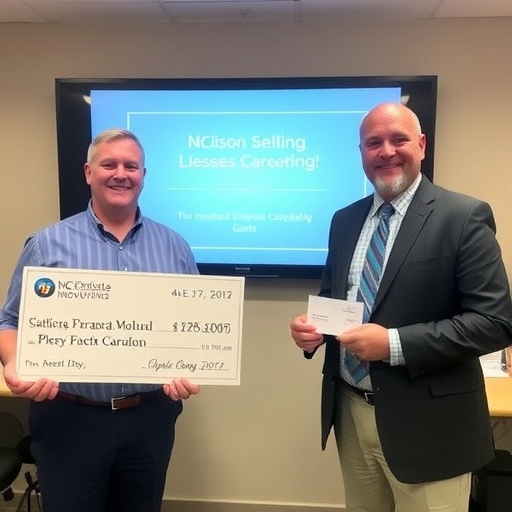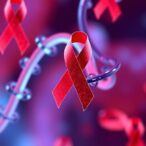
In a significant stride toward advancing scientific innovation in North Carolina, two researchers from the University of North Carolina at Greensboro (UNCG) have been awarded substantial grants from NCInnovation, a unique public-private partnership committed to propelling the commercialization of pioneering research emerging from the state’s universities. These grants are designed to enable the development of cutting-edge technologies with immense potential across diverse industries, marking a milestone in the university-to-industry technology transfer process.
Dr. Liam Duffy, an Associate Professor in the Department of Chemistry and Biochemistry at UNCG, is spearheading the development of a novel analytical instrument known as the “Quadrupole Mass Starkometer.” This innovative device aims to revolutionize the rapid analysis of isomers—molecules sharing identical molecular formulas but exhibiting distinct spatial arrangements of atoms. The ability to differentiate and analyze isomers efficiently is critical for comprehending and harnessing various chemical and biochemical phenomena, yet current techniques often require labor-intensive procedures, costly apparatus, and extended time frames. Dr. Duffy’s invention offers a promising solution by potentially accelerating analytical throughput while reducing operational complexity and cost.
The Quadrupole Mass Starkometer integrates principles of mass spectrometry with advanced electrical field manipulation to selectively differentiate isomeric species. By fine-tuning electric fields within the instrument, the device can discriminate molecules based on subtle differences in their structural conformations, facilitating real-time analysis with unprecedented precision and speed. Such technological advancement holds substantial implications for multiple sectors, including materials science, pharmaceuticals, agrochemicals, and academic research where rapid and reliable isomer analysis is indispensable. To bring this concept closer to practical application, NCInnovation has allocated a one-year grant of $253,000 to fund the prototyping and rigorous testing phases, which are critical to optimizing performance parameters and validating analytical capabilities.
.adsslot_UQreuNXvhL{width:728px !important;height:90px !important;}
@media(max-width:1199px){ .adsslot_UQreuNXvhL{width:468px !important;height:60px !important;}
}
@media(max-width:767px){ .adsslot_UQreuNXvhL{width:320px !important;height:50px !important;}
}
ADVERTISEMENT
Concurrently, Dr. Kaira Wagoner, a Research Scientist in UNCG’s Department of Biology and CEO of Optera—a biotech start-up specializing in honey bee health—has been awarded a two-year grant totaling $553,000. Dr. Wagoner’s research centers on the UBeeO Assay, an innovative pheromone-based tool that quantitatively measures hygienic behavior in honey bee colonies, a vital metric linked to their resistance against the destructive Varroa destructor mite. This parasitic mite has caused dramatic declines in honey bee populations worldwide, threatening both agricultural productivity and ecological balance due to the crucial role bees play in pollination.
The UBeeO Assay functions by detecting specific pheromone signals that correlate with hygienic behaviors such as the identification and removal of mite-infested brood. These behaviors contribute to the natural resilience of some colonies against mites and associated diseases. By enabling beekeepers to assess hygienic activity levels quickly and accurately, the assay facilitates selective breeding strategies aimed at producing healthier and more resilient bee populations. Beyond refining the existing assay, Dr. Wagoner’s research endeavors include developing a novel probiotic designed to induce hygienic traits in colonies, potentially offering a biological intervention to enhance colony health further. The NCInnovation support will accelerate the optimization of the UBeeO technology and the probiotic development, enhancing both the assay’s robustness and commercial scalability.
NCInnovation’s recent funding cycle reflects a strategic focus on university-led research projects that have demonstrated clear proof-of-concept and hold significant promise for commercialization and economic impact. The organization’s broad vision encompasses improving public health, agricultural sustainability, and industrial competitiveness by bridging the gap between academic discovery and market-ready technologies. The involvement of subject matter experts and commercialization specialists in a rigorous evaluation process ensures that only projects with tangible innovation milestones and scalable potential receive funding, underscoring the organization’s commitment to excellence and impact.
This year’s funding round, which includes 17 projects across North Carolina’s higher education institutions, represents a $13.6 million investment in regional innovation ecosystems. Among these, Professor Hemali Rathnayake from the Joint School of Nanoscience and Nanoengineering at UNCG received a pioneering pilot grant for her work in lithium refining—another testament to the university’s growing prominence in high-impact research domains. The collective emphasis on diverse fields ranging from life sciences to advanced materials highlights the interdisciplinary nature of modern scientific challenges and the critical role of universities in addressing them.
The awards granted to Drs. Duffy and Wagoner not only affirm their individual scientific accomplishments but also exemplify the transformative potential of supporting university research within a collaborative framework that encourages entrepreneurship and industrial translation. Dr. Duffy’s start-up, Moires Instruments LLC, and Dr. Wagoner’s company, Optera, are illustrative of a new generation of scholar-entrepreneurs who seamlessly integrate fundamental research with business development to ensure that innovations reach societal application.
From a technological standpoint, the Quadrupole Mass Starkometer is poised to deliver a paradigm shift in analytical chemistry, providing researchers and industry professionals with a tool capable of dissecting complex molecular arrangements rapidly and accurately. This capability is especially crucial in drug development, where precise knowledge of isomer composition can dictate therapeutic efficacy and safety. Similarly, in agrochemical research, understanding the activity of specific isomers can lead to the design of more effective and environmentally benign compounds.
On the ecological front, the UBeeO Assay represents a leap forward in apicultural science, marrying behavioral biology with biotechnology to tackle one of the most pressing threats to global food security—the decline of pollinator populations. By enabling actionable insights into colony health and fostering the propagation of mite-resistant bees, the technology aligns with broader environmental sustainability goals and supports the livelihoods of beekeepers and farmers alike.
As Dr. Michelle Bolas, Executive Vice President and Chief Innovation Officer of NCInnovation, articulates, the efforts to nurture and commercialize university discoveries are essential to fortifying America’s competitive edge. By enhancing the university-to-industry pipeline, initiatives like these contribute not only to scientific progress but also to job creation and economic resilience in the region. The infusion of capital and expertise heralds a promising era for North Carolina’s innovation ecosystem, demonstrating how targeted investment can catalyze substantial technological and societal advancements.
In summary, the NCInnovation grants awarded to Dr. Liam Duffy and Dr. Kaira Wagoner encapsulate a vibrant intersection of cutting-edge research, entrepreneurial vision, and strategic support mechanisms. Their projects underscore the vital importance of fostering academic innovation ecosystems that translate laboratory breakthroughs into impactful technologies addressing real-world challenges. As these initiatives progress through crucial prototyping, testing, and development stages, they promise to contribute meaningfully to scientific instrumentation and agricultural biotechnology landscapes.
The recognition and funding of such projects by NCInnovation reinforce the state’s reputation as a burgeoning hub for research excellence and commercialization. It sets a precedent for future collaborations between academia and industry, exemplifying a replicable model for other regions aiming to harness the full potential of university research. By empowering dedicated scientists and entrepreneurs through financial and infrastructural support, NCInnovation operates at the forefront of a transformative movement that leverages academic ingenuity to address societal needs, stimulate economic growth, and maintain technological leadership well into the future.
Subject of Research:
Analytical instrumentation for rapid isomer analysis and biotechnological tools for enhancing honey bee colony health.
Article Title:
UNCG Researchers Secure NCInnovation Grants to Advance Novel Isomer Analysis Instrument and Honey Bee Health Technologies
News Publication Date:
Not specified
Web References:
– https://ncinnovation.org/
– https://moiresinstruments.com/
– https://chem.uncg.edu/duffy/
– https://www.uncg.edu/employees/kaira-wagoner/
– https://researchmagazine.uncg.edu/spring-2023/part-of-the-hive/bee-business/
– https://opterabees.com/
– https://ncinnovation.org/media/ncinnovation-approves-13-6-million-to-support-17-university-rd-projects/
– https://research.uncg.edu/news/uncg-researcher-receives-ncinnovation-grant-for-lithium-refining-research/
Keywords
Isomer analysis, Quadrupole Mass Starkometer, honey bee health, Varroa destructor, UBeeO Assay, biotechnological innovation, NCInnovation grants, university research commercialization, analytical chemistry, environmental sustainability, apiculture, startup technology development
Tags: advanced analytical instrumentscommercialization of university researchDr. Liam Duffy researchisomer analysis technologymass spectrometry advancementsNCInnovation grantsnovel chemical analysis methodspublic-private partnerships in researchQuadrupole Mass Starkometerscientific innovation in North Carolinatechnology transfer in academiaUNCG research funding



